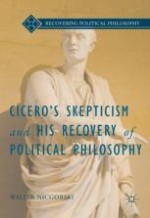2016 | OriginalPaper | Buchkapitel
Chapter 4 Political Philosophy and the Roman Republic
verfasst von : Walter Nicgorski
Erschienen in: Cicero’s Skepticism and His Recovery of Political Philosophy
Verlag: Palgrave Macmillan US
Aktivieren Sie unsere intelligente Suche, um passende Fachinhalte oder Patente zu finden.
Wählen Sie Textabschnitte aus um mit Künstlicher Intelligenz passenden Patente zu finden. powered by
Markieren Sie Textabschnitte, um KI-gestützt weitere passende Inhalte zu finden. powered by
